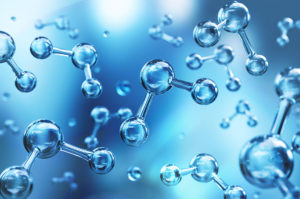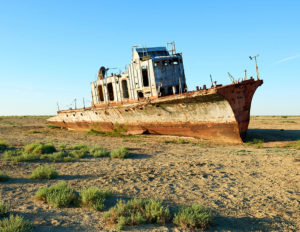
Water
Water is crucial for life. In the scientific search for life in the solar system, water is what they are looking for. Life simply cannot exist without water.

Water is a fascinating compound with unique properties. A molecule formed by two such simple elements as hydrogen and oxygen should presumably be a gas at room temperature. Instead, it is a liquid that boils at 100°C and, unlike almost all other chemicals, the density of water reaches a maximum not in the solid state, but as a liquid at a temperature slightly above freezing at +4°C. If it were not for this, lakes would freeze from the bottom instead of from the surface as they do now. Fish would then have problems surviving in northern climates.
Water is also a fantastic solvent that can dissolve, although not all, but a very extensive range of other chemicals. Although it is very useful in many contexts, this is sometimes also a problem. Hazardous substances can easily dissolve and end up where they can cause problems.
Environment
The importance of water for humanity is reflected not least by the fact that 2 of the UN’s 17 Sustainable Development Goals for 2030 are related to water. Indirectly, almost all of them depend on access to clean water.

Today, there is a growing awareness of the importance of water in society. This awareness means, for example, that:
- Local water sources should not be polluted
- Water scarcity is a problem, even in sparsely populated areas in northern Europe.
- Apparently non-toxic substances pose new environmental threats, such as microplastics, sulfates, etc.
- Not only groundwater, lakes and rivers, but also oceans are affected.
An important tool used to better understand the impact of human consumption on water is various forms of measuring the “footprint” it leaves. Although these are valuable for understanding and comparing statistical differences and identifying effective technology, they overlook another important feature: When industries grow larger, the challenge is no longer limited to ensuring low specific water consumption or low concentration of pollutants to the recipient.
Even the size of the industry itself can be a challenge if water resources are limited. This means that even a highly efficient industry locally may still consume too much water or locally discharge too much pollution for the environment to handle.
Read more about the 17 goals of the United Nations to transform our world.
Social responsibility
By being part of an industry, you are also part of society. This inevitable fact is becoming increasingly apparent to a growing number of companies.

Today, there is a growing awareness of the importance of water in society. This awareness means, for example, that:
- Local water sources should not be polluted
- Water scarcity is a problem, even in sparsely populated areas in northern Europe.
- Apparently non-toxic substances pose new environmental threats, such as microplastics, sulfates, etc.
- Not only groundwater, lakes and rivers, but also oceans are affected.
An important tool used to better understand the impact of human consumption on water is various forms of measuring the “footprint” it leaves. Although these are valuable for understanding and comparing statistical differences and identifying effective technology, they overlook another important feature: When industries grow larger, the challenge is no longer limited to ensuring low specific water consumption or low concentration of pollutants to the recipient.
Even the size of the industry itself can be a challenge if water resources are limited. This means that even a highly efficient industry locally may still consume too much water or locally discharge too much pollution for the environment to handle.


